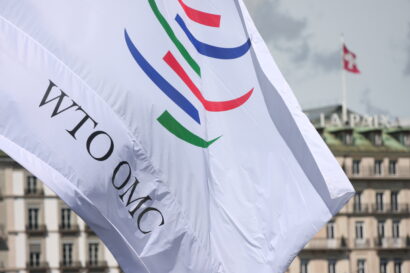A century since the League of Nations first began to discuss international taxation, the ICTD’s Martin Hearson argues that global tax governance is at a major inflection point. This is the first of several blog posts this week, in the run up to an ICTD conference facilitating critical debates on the future of multilateral cooperation. Join the discussions by tuning in to the ICTD’s livestream.
The current moment
As the ‘two-pillar‘ negotiations at the OECD’s Inclusive Framework over the tax challenges of digitalisation inch their way towards a conclusion, there is a sense that a decade long experiment with inclusiveness has disappointed. Stalemate was resolved through a complex and unsatisfying fudge, forced through almost unanimously thanks to some heavy diplomatic pressure. While the outcome includes numerous changes to accommodate lower-income countries, it redistributes little to lower-income countries, creates more complexity, and comes at considerable cost in terms of tax sovereignty. One of four holdout countries, Kenya, has now signed on, apparently as a condition of trade negotiations with the US. I think Pillar One is unlikely to see widespread implementation in practice in lower-income countries, because for many there is too little money in it. There is little prospect that the OECD will try something so ambitious again, yet appetites for a revisiting of the historical consensus have been whet.
May they be sated over at the UN? The current expert tax committee is increasingly willing to chart a divergent path from the OECD, forcing through positions supported by the developing country majority against the wishes of the minority of members from OECD countries – although new provisions of the UN model convention will only become law if treaty partners are willing to accept them. For decades, lower-income countries have been pushing for an intergovernmental tax body at the United Nations, an aspiration quashed each time by horse trading and diplomatic pressure – until last year. While there is a range of views about what a new UN body could and should achieve, nobody I have spoken with is confident of where the discussions will go.
Path dependence and moments of radical change
The concept of a critical juncture comes from the political science tradition of historical institutionalism, which is preoccupied with the notion that institutions, once created, are path dependent and resistant to change. Unable to overhaul them radically, agents who seek to reform them are reduced to incremental strategies such as gradually reinterpreting rules, or layering new rules on top of existing ones.
The international tax regime is often considered a prime example of path dependence. Philipp Genschel and Thomas Rixen attribute its resilience to three factors: states’ sunk costs in thousands of bilateral treaties and domestic laws based on OECD norms; the lack of a ‘plausible alternative’, and the desire to preserve an inbuilt distributional bias in favour of OECD states. Along these lines, Todd Tucker and I explained the decades-long march towards tax treaty arbitration in terms of incremental change strategies; others have focused on the resilience of the arm’s length principle.
The exception to this picture of stability in historical institutionalism is a disruptive moment called a ‘critical juncture’ defined somewhat drily as “relatively short periods of time during which there is a substantially heightened probability that agents’ choices will affect the outcome of interest.” At such a moment, multiple possibilities that would usually be closed suddenly open up. Typically, a critical juncture might be a moment of crisis, when existing institutions are unable to cope with an urgent challenge: the financial crisis of 2007-9, for example, led to changes in economic policy orthodoxy and to a reconfiguration of global governance arrangements.
Are we at a critical juncture now?
The OECD-centric regime has been under pressure since 2008, the result of shifting global power dynamics, the challenge of digitalisation, and the entrance of tax avoidance and evasion into the political zeitgeist. At institutional level, the OECD states’ response was to open up, at least in principle: first, they gave up their oligopoly by progressively opening the standard-setting franchise, to the G20 and then beyond; second, they opened the Pandora’s box of the distribution of taxing rights, explicitly acknowledging the intention to give a greater share to states in which multinationals sell their goods and services. In parallel, a new wave of donor-led support means that lower-income countries are more engaged with international tax standards than ever, and they are developing stronger negotiating capabilities; at the same time, they are facing fiscal pressures resulting from global inflation, the pandemic, and sovereign debt payments.
The result is, in my view, irreversible. Expectations have been created, both that countries outside the OECD must be at the negotiating table, and that issues of concern to them – gaining a greater share of taxing rights, and simplification of complex tax instruments – need to be considered. The spread of digital services taxes shows some states calculating that the current international consensus is not worth their while. Yet any expectation that they could significantly alter that consensus has recently confronted an obstacle that was perhaps not hard to anticipate: OECD member states are not willing to accept significant changes to their detriment. Indeed, one way to view the changes to OECD corporate tax standards since 2008 is as an attempt to safeguard their historical architecture through modest levels of accommodation.
A recipe for reform led by lower-income countries
What is the potential of this moment? We must begin with what I think is the overriding structural constraint. There is no prospect of a consensus about reform to international tax standards, whether at the OECD, UN or elsewhere, that is deep, universal and strong. That is, any reform must compromise on one of these three aspects: it must be a shallow, modest reform; it must omit some countries; or it must be soft and non-binding.
Faced with this constraint, there are four conditions that I think need to be met for a significant break with the past:
First, lower-income countries need to become agenda-setters. In none of the major OECD-led processes to date have they defined the terms of negotiation. On a smaller level, this means identifying desirable changes to international standards, building a coalition, and choosing an institutional venue to promote them. The UN model treaty is already becoming such a venue, with a growing number of changes adopted at the initiative of lower-income countries. But it may be a mistake to assume that the agenda should always be set in multilateral forums. As OECD countries know well, an effective way to influence is to act at unilateral or regional level first.
Second, the ambition of deep, universal consensus must be abandoned. A world in which countries must choose between global standards and unilateral measures is inevitably one with an inbuilt bias towards the countries that spent a century building the former. The ambition of multilateralism should instead be for managed pluralism: to support countries that wish to develop different approaches to taxation, by minimizing friction between them. Multiple overlapping standards might sound like a recipe for complexity, but, if managed right, it could produce a simpler landscape overall: the content of rules agreed among smaller groups of countries with shared interests could be much simpler, since much of the complexity in OECD standards results from attempts to keep so many different players on board.
Such a way of working is really an evolution of the way states approached global tax governance until recently: the work of problem definition and solution development was not done first at multilateral level, but rather the role of the OECD and UN was to broker a compromise between national or regional positions. Again, the UN model has arguably begun to play this role, at least technically. Its Article 12A on fees for technical services provides a standardised text and commentary for a treaty provision already found in many lower-income countries’ treaties. Article 12B goes further, providing a means of integrating digital services taxes, which have already begun to proliferate as unilateral measures, into the treaty regime.
Third, we need a hard look at the subject matter of international cooperation. For what do different countries need it? The transaction costs of participation in standard-setting processes, as well as adopting their outcomes, will exceed the benefits for different countries in different areas, requiring some give and take. Many lower-income countries are not ready for automatic exchange of information, for example, but do need mutual assistance to help recover the proceeds of tax avoidance and evasion. For some, robust withholding taxes and reforms to VAT may be the most helpful change in the digital space. With wealth and solidarity taxes high on the political agenda, new international cooperation needs are likely to emerge for countries that adopt them. Carbon taxes, meanwhile, are likely to be the new focus of cooperation at the OECD, and they may well be essential in the fight against climate change, but they are yet to climb the political agenda in lower-income countries that are unlikely to see much revenue from them.
Finally, the disconnect between the political and technical spheres in international tax policymaking needs to be overcome. Throughout my research on lower-income countries’ negotiation experiences, a common theme has been political principals who are mostly disengaged from the substance of international tax, but whose occasional interventions can undermine the efforts of their technical experts. This can happen when decisions to join multilateral bodies or conclude bilateral treaties are taken over the heads of technicians, when the latter’s hard-fought negotiating positions are overruled by political pressure, or when deals struck at official level fail to be signed and ratified. At both national and regional levels, lower-income countries need collaboration between the officials who work with international tax standards, and policymakers whose backing they ultimately need – and by whom they should be held accountable. The movement for an intergovernmental tax body at the UN has not itself been driven by the technocrats who represent lower-income countries in the current institutions of tax cooperation, but by other parts of their governments. The outcome of those deliberations will surely depend on the extent of cooperation, not just between governments, but also within them.



